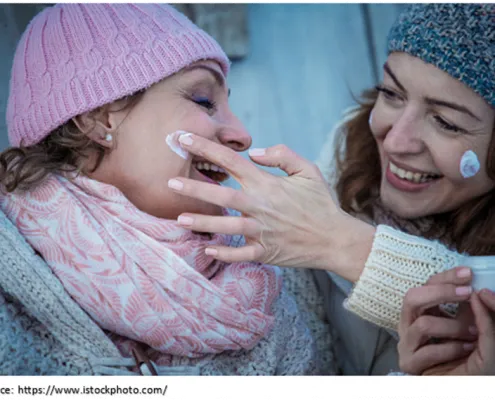The weather pattern around the world has changed in general. Bangalore is no different.
Bangalore has witnessed rains up to December 2021. The temperatures dropped to as low as 7degrees. Many of us have chapped lips, dry and static hair, and rough skin.
With a mix of weather conditions these days, the traditional skincare method of moisturizing is also not serving its purpose well, especially the face.
This leaves us with no alternative but to take experts’ opinions on how to care this winter for dry skin. Dr. Swetha’s Cosmoderm Centre is a skin clinic in Indiranagar, Bangalore. The holistic approach and high-quality treatments at Dr. Swetha’s Cosmoderm Centre are well-known.
Dr. Swetha, a renowned dermatologist in Indiranagar, is the brains behind this cutting-edge facility. She is noted for providing each patient with a tailored treatment plan based on their medical and cosmetic needs.
A wide selection of skincare treatments such as fillers, botox, PRP, thread facelift, and other treatments include HydraFacial MD, laser solutions, microdermabrasion, and chemical peels, are available at a reasonable cost.
Furthermore, this youthful and active skin specialist in Indiranagar, Bangalore, places a strong emphasis on providing high-quality services utilizing FDA-approved technologies, and your anonymity is protected.
What are the signs and symptoms of dry skin?
The following are a few of the most prevalent signs and symptoms of dry skin:
- a flaky or scaly appearance
- Itching, redness, rough texture
- inflamed, raw skin
- stinging or burning skin cracks
Xerosis is a medical term for dry skin. Symptoms can vary in severity and appearance depending on whatever part of your body is affected.
How can I prevent my skin from becoming dry in the winter?
Winter skin isn’t always dry. You may be able to keep your skin looking soft, smooth, and vibrant all winter long by making certain changes to your winter skincare routine and habits, as well as using the proper products.
Let’s take a deeper look at 11 recommendations that can help you improve your skin’s health during the winter months.
1. Moisturizing routine.
Every time we wash our body with soap or hot water, it loses its oils.
To replenish the moisture and oils of our skin, apply moisturizer after washing and dabbing off the excess water.
Keep a bottle of moisturizer next to your sink as a reminder, and carry a travel-size moisturizer with you when you are out and about.
2. Utilize sunscreen lotion.
You should not skip the sunscreen when the sunlight is not harsh. The sunlight will still continue to damage your skin.
You should first moisturize and then apply sunscreen with SPF 30, even in the winter.
3. Apply serums and creams suitable for overnight use.
Overnight treatments might help to rejuvenate or prevent dry skin. Emollients are excellent. However, because it is a thicker cream, it may take longer to absorb.
Your skin will have the time it needs to absorb the cream and for the emollient to replace the moisture and oils the skin requires.
If you are applying ointment to your hands or feet, wear mittens and socks.
4. Make changes to your skincare routine
If your facial skin appears to be particularly sensitive or inflamed as a result of the dry winter air, cut down on the products that you use for the face.
Keep in mind that your skin’s moisture should be balanced for the serums, toners, and other beauty treatments to work properly.
Also, inflamed skin may be more sensitive to chemicals such as scent and alcohol. As a result, things that would typically feel nice on your face may become irritants.
Keep your skincare routine as easy as possible. In the morning, use only a moisturizer and sunscreen, and at night, use a light cleanser with a moisturizer.
Once you are certain that your skin’s moisture barrier is in good shape, you can gradually resume using other treatments and substances.
5. Keep your surroundings humidified.
Humidifying machines are available in the market. You might want to get one because it reinstates humidity in the air, thereby keeping your skin supple with moisture.
6. Use lukewarm water for bathing and washing.
As tempting as it might be to take a nice hot water bath on cold days, you should remember that it washes of body oils too. So instead, use lukewarm water.
Also, be cautious when drying your skin after a bath or shower. Instead of massaging your skin vigorously, gently pat it with a soft towel to allow some of the moisture to penetrate the top layer of your skin.
7. Use exfoliants and scrubs sparingly.
You should opt for soft exfoliators instead of grainy ones to avoid further skin damage. It will keep your skin soft and healthy.
8. Include occlusives in your daily routine.
If deep repair creams aren’t doing enough to repair your dry skin, you might wish to add occlusive components to your skincare regimen.
Occlusive substances create a physical barrier that prevents moisture from escaping your skin. Occlusive substances include the following:
- cocoa butter
- shea butter
- jojoba oil
- rosehip oil
Vaseline and Aquaphor are petroleum jelly-based products.
The ideal method to include these products into your daily routine is to apply them after moisturizing once or twice a day.
9. Drink plenty of water.
Water is the essence of life. Even though you may not feel that thirsty, drink your normal intake of water that is about 10 to 12 glasses a day. Also, include omega 3 fatty acids and antioxidants in your diet to regenerate cells.
10. Select fabrics that are non-irritating.
When your skin is sensitive and irritable, it is best to choose natural fabrics that are a loose fit.
Also, use special detergents which are mild in concentration for washing your clothes.
11. Put on your mittens.
Woolen mittens are the most effective physical barrier against environmental agents that might dry up your hands’ skin.
Wear warm mittens while going outside in the cold.
Keeping your hands smooth and hydrated can be as simple as limiting the amount of dry air and hot water that comes into contact with them.
When should you see a doctor?
While several at-home solutions can help with dry skin, it’s crucial to see a doctor or dermatologist if your symptoms worsen or don’t go away.
The doctor will give you a prescription for treatments tailored to your specific symptoms.
Last but not least:
It’s not uncommon to have dry, flaky skin in the winter, which can impact not only your face but also your hands, feet, and other exposed regions.
Moisturizing your skin with the appropriate products on a regular basis is the key to keeping it healthy. Overuse of exfoliating scrubs, hot water, and other skincare procedures should also be avoided.
You can also protect your skin by using a humidifier, wearing non-irritating textiles and gloves, and being well hydrated.
If at-home solutions don’t seem to be helping your dry skin, talk to your doctor about finding the correct treatment.


